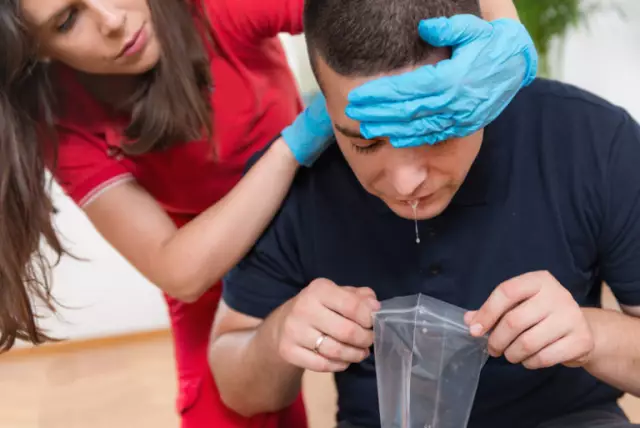- Author Rachel Wainwright wainwright@abchealthonline.com.
- Public 2023-12-15 07:39.
- Last modified 2025-11-02 20:14.
Milk poisoning
Opinions about cow's milk are contradictory. Disputes about its benefits for human health have been going on for decades. Despite disagreements among scientists, for millions of people around the world, milk is an important part of the diet, in particular, because of its nutritional value and easy digestibility, milk is considered one of the main foods for children.
At the same time, the use of milk can cause a rather severe poisoning.

Source: depositphotos.com
How does milk poisoning happen?
The high nutritional qualities of milk make this drink an optimal breeding ground for pathogens. Violation of sanitary and hygienic norms of production and storage rules of the product contribute to the rapid growth of pathogenic flora.
The main causes of milk poisoning:
- obtaining milk from sick cows (for example, suffering from mastitis);
- poor animal care;
- pustular skin diseases in staff caring for cows;
- violations of sanitary standards at work;
- improper storage of milk.
Most often, poisoning is associated with staphylococcus contamination of milk, but it can also be caused by other pathogenic or opportunistic microorganisms.
Once in the gastrointestinal tract, microbes begin to multiply actively and, in the process of their vital activity, produce a toxin that causes inflammation of the intestinal mucosa. As a result, the process of digestion and absorption of nutrients is disrupted, epithelial cells begin to secrete water into the intestinal lumen. All this leads to the development of gastroenteric syndrome. In addition, poisonous substances enter the bloodstream, causing intoxication.
Symptoms of milk poisoning
The incubation period for milk poisoning is short, usually not exceeding 24 hours. The main symptoms are:
- nausea;
- vomiting;
- cramping abdominal pain;
- diarrhea;
- increased body temperature;
- weakness;
- headaches;
- dry mucous membranes;
- increased feeling of thirst.

Source: depositphotos.com
First aid for milk poisoning
When the first symptoms of milk poisoning appear, urgent measures should be taken to eliminate the spoiled product and bacterial toxins from the body, as well as to replenish the fluid lost by the body.
- Flush the stomach. The patient is given about a liter of water to drink, after which they induce artificial vomiting, irritating the root of the tongue. Attention! Do not wash the stomach at home for children!
- Take medicines with an absorbent effect. Such drugs are able to absorb toxic substances in the intestines and remove them naturally. For this purpose, you can use Activated carbon, Enterosgel or any other adsorbent.
- Perform oral rehydration. This is necessary to reduce intoxication and prevent dehydration. The patient is given a solution of Rehydron or Reosolan to drink often and in small portions. If these preparations are not at hand, plain water or weakly brewed black tea will do.
When is medical attention required?
Milk poisoning is usually mild to moderate. Its symptoms disappear within three days.
Medical assistance is needed in the following cases:
- indomitable vomiting;
- diarrhea more than 10 times a day;
- persistence of symptoms of poisoning for more than three days, despite the treatment;
- acute abdominal pain;
- the appearance of blood in the feces;
- a significant decrease in the amount of urine.
It is also necessary to seek medical help when milk poisoning occurs in a pregnant woman, an elderly person or a child.
To treat milk poisoning, doctors usually prescribe antibiotics or sulfa drugs. In addition, infusion therapy is carried out, aimed at eliminating intoxication and restoring water and electrolyte balance. To restore the digestive function, the use of enzyme preparations is indicated.
Possible consequences
In the vast majority of cases, milk poisoning passes without any long-term consequences. As long as the inflammation of the intestinal mucosa persists, the patient may experience unstable stools. This usually goes away within a few weeks. To accelerate the normalization of digestion, the patient during the recovery period is advised to adhere to a dietary diet, excluding from the diet heavy and irritating to the mucous membrane of the gastrointestinal tract (fatty, fried, spicy foods).
In young children, especially in the first year of life, the consequences of milk poisoning can be serious. A child's body is more sensitive to fluid loss than an adult. In children, exicosis easily develops, and in severe cases, hypovolemic shock. Treatment for these complications of milk poisoning is carried out in the intensive care units of infectious diseases hospitals.
Prevention
To avoid milk poisoning, you should follow the rules:
- When buying milk in a store, give preference to an ultra-pasteurized product, paying attention to the expiration date of the package;
- Boil milk purchased on the market for 10 minutes before use;
- Store milk only in a refrigerator in a glass container for no more than 3 days.
YouTube video related to the article:

Elena Minkina Doctor anesthesiologist-resuscitator About the author
Education: graduated from the Tashkent State Medical Institute, specializing in general medicine in 1991. Repeatedly passed refresher courses.
Work experience: anesthesiologist-resuscitator of the city maternity complex, resuscitator of the hemodialysis department.
The information is generalized and provided for informational purposes only. At the first sign of illness, see your doctor. Self-medication is hazardous to health!






